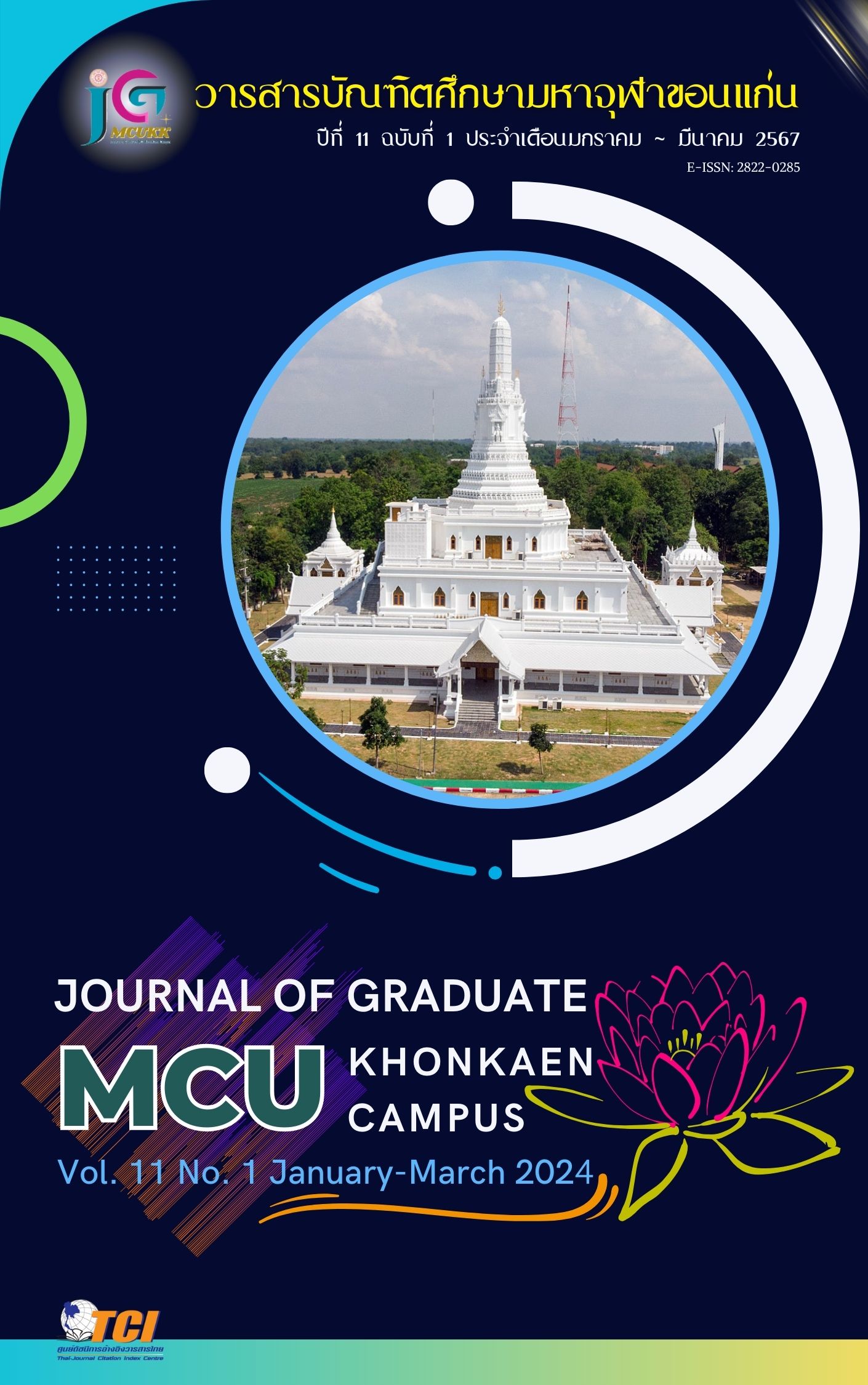Educational Leadership and Personnel Participation in Administration of Educational Institutions According to the Principles of Social Object 4
Main Article Content
Abstract
This article aims to study the leadership qualities and the personnel participation of Administration educational, incorporating the principles of Buddhism, institutions
according to the principles of social object 4, as a guiding framework. Educational leadership refers to the characteristics and skills that leaders in the field of education should possess to create a conducive learning environment and achieve positive
outcomes for students. Leadership is an ongoing process of collaboration, fostering cooperation in various school activities, and defining roles in managing the school system effectively. The ultimate goal is to enhance the learning experience throughout the school.
Leadership involves a continuous interaction to ensure collaborative efforts in school activities. It also includes defining roles in managing the school system to achieve set objectives. This is done systematically and with clarity to develop the learning environment within the school. Incorporating the principles of Buddhism, into educational leadership can lead to stability, progress, and mutual respect among individuals. Effective leaders in the modern globalized world recognize that "work" cannot be accomplished by individuals alone. Instead, it requires cooperation and collaboration among team members. In conclusion, effective leadership in the contemporary world requires the application of moral principles, such as the principles of social object 4, to foster collaboration, mutual respect, and harmonious working relationships. By doing so, we can work together happily and lead Thai society toward progress on par with other developed national
Article Details

This work is licensed under a Creative Commons Attribution-NonCommercial-NoDerivatives 4.0 International License.
References
กระทรวงศึกษาธิการ. (2562). พระราชบัญญัติการศึกษาแห่งชาติ พ.ศ. 2562. กรุงเทพฯ: คุรุสภา.
กิตติศักดิ์ อังคะนาวิน. (2563). การมีส่วนร่วมในการบริหารสถานศึกษาของบุคลากรทางการศึกษา. วารสารสหวิทยาการมนุษยศาสตร์และสังคมศาสตร์, 3(1), 16-17.
ติน ปรัชญาพฤทธิ์. (2527). ภาวะผู้นำและการมีส่วนร่วม. นนทบุรี: มหาวิทยาลัยสุโขทัยธรรมาธิราช.
พยอม วงศ์สารศรี. (2534). การบริหารบุคคล. กรุงเทพฯ: พรานนกการพิมพ์.
พระธรรมปิฎก (ป.อ.ปยุตโต). (2546). ภาวะผู้นำ. กรุงเทพฯ: ธรรมสภา.
พระพรหมคุณาภรณ์ (ป.อ.ปยุตฺโต). (2546). พจนานุกรมพุทธศาสตร์ ฉบับประมวลธรรม. (พิมพ์ครั้งที่ 12) (บันทึก 9 สิงหาคม พ.ศ. 2547).
พระมหาปฐมภูมิ ปฺญฺญาปทีโป (จังพล) และ จิราภรณ์ ผันสว่าง. (2565). ภาวะผู้นําทางการศึกษากับการพัฒนาตามแนวเศรษฐกิจพอเพียง. วารสารการบริหารการศึกษา มมร.วิทยาเขตร้อยเอ็ด, 2(1), 43-52.
พระมหาสิริยา สิริยโส (ชาลีเปรี่ยม). (2563). รูปแบบการบริหารจัดการการศึกษาแบบมีส่วนร่วมเชิงพุทธ. พระนครศรีอยุธยา: มหาวิทยาลัยมหาจุฬาลงกรณราชวิทยาลัย.
พระมหาอำพล ชัยสาร และคณะ. (2565). ภาวะผู้นำทางการศึกษาในศตวรรษที่ 21 กับความเชื่อมั่นในตนเอง. Journal of Modern Learning Development, 7(7), 417-436.
วรรณภา ใจเย็น และ ศันสนีย์ จะสุวรรณ. (2564). การบริหารแบบมีส่วนร่วม. การประชุมวิชาการนำเสนอผลงานวิจัยระดับชาติและนานาชาติ ครั้งที่ 14, 1110.
วรวุฒ พลเพชร. (2564). สังคหวัตถุ 4 : ภาวะผู้นำทางการศึกษากับทีมงานทางการศึกษาไทย. วารสารนิตยสารเสียงธรรมจากมหายาน, 7(2), 50-62.
ศิริวรรณ เสรีรัตน และคณะ. (2542). องค์การและการจัดการ. กรุงเทพฯ: ดวงกมลสมัย.
สุวนันท์ สารคำ. (2565). การบริหารงานวิชาการตามหลักสังคหวัตถุ 4 ของผู้บริหารสถานศึกษาสังกัดสำนักงานเขตพื้นที่การศึกษาประถมศึกษาเลย เขต 2. พระนครศรีอยุธยา: มหาวิทยาลัยมหาจุฬาลงกรณราชวิทยาลัย.
สุนทร โคตรบรรเทา. (2560). ภาวะผู้นำในองค์การสถานศึกษา. กรุงเทพฯ: ปัญญาชน.
อินถา ศิริวรรณ. (2557). รูปแบบของภาวะผู้นำทางการศึกษา. สารนิพนธ์, 451-458.
Argyris, C.. Interpersonal competence and organizational effectiveness (Homewood: Irwin-Dorsey, 1964). 21.
Hodge Billey J. & Herbert J.Johnson, (1970). Management and Oganization Behavior, Newyork: John Willey & Sons, pp. 255-259.

